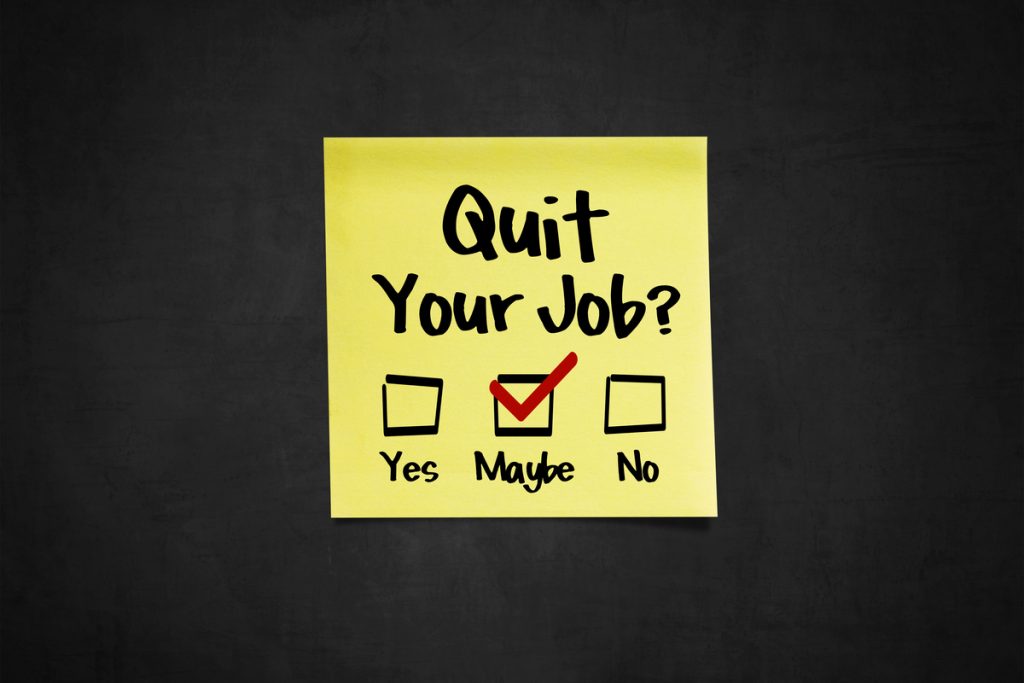
Dear Readers,
I’ve had two clients this year who quit their jobs, feeling justified that the environment was so bad, and the boss so outrageously horrible that they just couldn’t stay for one more day. In fact, one of them was asked to work in an area with toxic materials and refused to for her health.
Another one witnessed his manager refer to African American clients using the ‘N’ word. Yes, both of these situations were outrageous, wrong and require a strong reaction. And in both cases, the individuals quit on the spot. They told the manager they could not tolerate this untenable and unreasonable work environment, and they were leaving. And in both cases they tried to apply for unemployment insurance and were denied.
And I’d like to share that when I was young, (defined as 20s-30s) I was also in an untenable situation and quit on the spot. I found out that the owner of the small multimedia production company I was working for in NYC was not paying the creative freelancers. These talented artists and writers, who did substantial amounts of work for him, would do good work in full faith of being paid at the end of the project, and he did not pay them. He moved on to an almost unlimited pool of freelance talent in the city. I did notice that it was curious that our freelancers seemed to be moving through a revolving door, but I only found out the truth of the situation when I became good friends with one of the writers. He confided in me that he was not paid and could not take the time to fight back. He needed to move forward to the next gig to make money to survive. I was shocked and incensed and felt fully justified in quitting. On the spot!
The good side of quitting when you know you are in an unethical or unhealthy or toxic environment is that you know you stood up for what was right. You put your stake in the ground that you would not tolerate these actions or behaviors. And you reinforce to yourself that you are a person of conviction, good morals and ethics. You confirm your identity as a good person who stands up for what’ is right. And that feels good. Plus, it feels good to confront that boss and let him or her know that you know his or her ways and won’t be a part of them. And you are free of the toxic environment.
The bad side of quitting on the spot is that you are the one left unemployed and often without a way to get unemployment insurance. So, in a sense you have bitten off your nose to spite your face.
And another downside of quitting is that it is more difficult to find new employment when you are out of work. Job candidates always look more attractive when they are currently employed. It’s just the way it is. It’s perception vs reality, and you are perceived as somehow weak or less in the job market when you are not working. Additionally, you will not be doing yourself any favors by telling potential employers why you left your last job. Even though you know you were justified, and it was an untenable environment, it is never perceived positively to bad-mouth a past employer.
So what should you do when you are in a horrible work situation?
First thing, if there is an HR person or department tell them what is happening. In best case scenario HR will be responsive and initiate change. If you are in a large company, perhaps you can ask to move to a new department or work for a different manager. Perhaps, once HR knows of the behavior, they will get it corrected.
OK, if you are in an organization where the HR person is perhaps complicit with the badly performing manager, you need to document this situation thoroughly to be ready when you need that justification for unemployment.
If it is a very small organization you might not have any place to go.
So what should you do?
I suggest you tell yourself that this is now a temporary situation. And again, document it all while you work really hard to find a new job.
And if you have sick days or any kind of personal time off (PTO) or vacation days coming, take time away to build up your strength and resources to get back and do your job, but focus on finding a new one. Update your resume, Linkedin profile and get working on your network to find new, permanent employment.
If that is hard, then at least look for temp work that could keep you with some income to pay your bills.
Once you have secured new work, give two weeks notice, and move on.
Or, keep documenting the problems and show they are not being addressed and have that documentation ready to justify and meet the requirements for unemployment insurance.
Looking back, I’m still glad I left my job when I found out the owner was not paying the freelancers, but I did go through a challenging period of unemployment, eating rice and beans and being fearful about my future. I ended up getting some temp work and finally a new job. But had I had this advice that my older, wiser self just offered, perhaps I would have stayed on and done a job hunt while on the job, seeing it as a temporary situation.
Onward to good work, good management, good times and good luck!
Coach Joan

